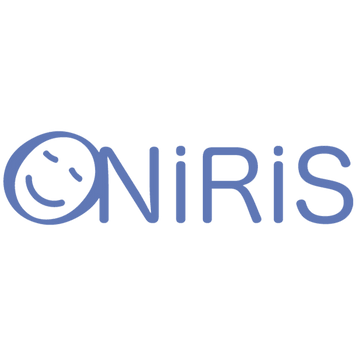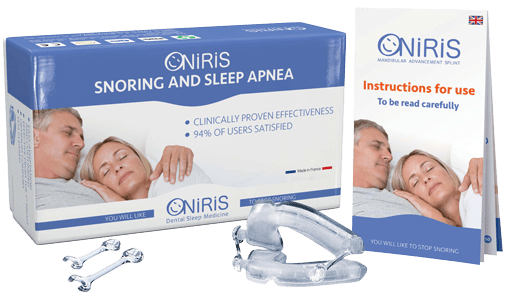Home / Sleep apnoea / Risks
What are the consequences of sleep apnoea?
Sleep apnoea is a sleep disorder characterised by repeated involuntary respiratory stops during the night. A person is considered to have sleep apnoea when they stop breathing for periods of at least 10 seconds. These breathing breaks can sometimes last up to a minute. What are the consequences of sleep apnoea? What are the risks involved? The following information will help you to understand more clearly.
Is sleep apnoea dangerous?
Sleep apnoea can cause a number of inconveniences and illnesses if left untreated. Obstructive sleep apnoea is a serious pathology: repeated episodes (dozens or even hundreds of times during the night) inevitably lead to a drop in the level of oxygen in the body, but also to poor sleep quality. The latter, fragmented, can then activate many mechanisms and lead to serious metabolic and cardiovascular consequences.
The symptoms of sleep apnoea are numerous. In the short term, sleep apnoea leads to frequent fatigue, headaches, daytime sleepiness and irritability. In the long term, sleep apnoea syndrome can have much more serious consequences on the body.
The risk of heart disease linked to sleep apnoea
Obstructive sleep apnoea can be the cause of several heart diseases. Its impact on the cardiovascular system, caused by poor breathing and insufficient oxygen in the blood is significant. The lack of oxygen in the blood forces the heart to be more active; consequently, it tires more quickly.
Cardiovascular disorders then appear. The risk of a heart attack, stroke, heart rate disorders or heart failure is very present. In case of severe apnoea, the risk of dying in one’s sleep is increased. Sleep apnoea also exposes you to high blood pressure.
High blood pressure: a consequence of sleep apnoea
The risk of high blood pressure is three times higher in people with sleep apnoea than in those without it. During apnoea, the oxygen concentration in the blood drops significantly. The brain protects the body by raising the blood pressure. The body then becomes exhausted: it cannot rest properly, nor even lower its blood pressure, as is normally the case during sleep. A major problem that should also be pointed out is that it would appear that sleep apnoea reduces the effectiveness of treatments against high blood pressure; 80% of patients suffering from high blood pressure resistant to treatment suffer from sleep apnoea. It is therefore essential to detect the disease in order to be able to treat it.
The risks of depression linked to sleep apnoea
The consequences of sleep apnoea are not limited to the effects on the body. They can have a significant psychological impact. Several studies have shown that sleep apnoea increases the risk of depression.
Researchers have made a revealing discovery about the severity of sleep apnoea: the greater the degree of severity of apnoea, the greater the risk of depression. Why is that? It can be assumed that the increased risk of depression is related to the deterioration in quality of life, caused by sleep deprivation, resulting from apnoea.
Sleep apnoea: consequences on your attention span
Sleep apnoea can have serious consequences on attention span. Poor quality sleep leads to several inconveniences: inability to concentrate, learning difficulties, memory problems, lack of alertness, etc. These consequences are harmful in both personal and professional life.
Lack of alertness, for example, increases the risk of having a road accident, or being injured during a risky manual task. Learning difficulties and lack of concentration, on the other hand, can affect your performance at work as well as your social life. Mild memory problems are often noticed in people with sleep apnoea.
A link between sleep apnoea and diabetes
A final risk for people with sleep apnoea is that it can lead to diabetes. Recent studies have shown that sleep apnoea leads to type 2 diabetes, just as diabetes leads to sleep apnoea. In fact, decreases in oxygen levels in the blood can considerably increase resistance to the action of insulin, a mechanism involved in the predisposition to diabetes.
These studies also show that sleep apnoea is present in more than 50% of type 2 diabetics, while diabetes is quite high in subjects with sleep apnoea. The correlation between the two diseases is thought to be due to the risk of increased hyperglycaemia in the presence of sleep deprivation, but also to anatomical factors that promote sleep apnoea (such as enlarged tonsils). As you can see, there are serious links between sleep apnoea and type 2 diabetes. Screening for sleep apnoea is therefore essential in people with type 2 diabetes, or overweight people (more prone to both diabetes and sleep apnoea).
These are not the only consequences of sleep apnoea. Correlations with other types of disease have been demonstrated, such as an increased risk of cancer or the early onset of Alzheimer’s disease.
In addition to these risks linked to the development of diseases, sleep apnoea can have harmful consequences for your relationship. Decreased libido or risk of impotence, sleep apnoea can become a real hindrance to your life as a couple.
For all these reasons, a consultation with a specialist is necessary in order to detect and treat sleep apnoea syndrome in the best possible way and thus avoid complications.
ONIRIS – Class I medical device manufactured by ONIRIS SAS and indicated in the treatment of snoring and sleep apnoea – Read the leaflet carefully before use – Ask your doctor or pharmacist for advice. This medical device is a regulated health product which, under these regulations, bears the CE mark.
Say goodbye to snoring!
Oniris® oral device
- Unique comfort to sleep peacefully
- Unmatched clinical effectiveness
- Secure online payment
A complete range of oral devices to meet your needs
| ONIRIS | ONIRIS Pro | Tali | |
|---|---|---|---|
| Freedom of movement | |||
| Millimetre-adjustment of the advancement | |||
| Custom-made impression | |||
| Clinically approved for snoring | |||
| Clinically approved for sleep apnoea | |||
| Approved by the French National Authority for Health | |||
| Developed by a trained dentist | |||
| Custom-made | |||
| Waiting time | 24-48 hours | 30 days | 3 to 9 months |
| Average lifespan | 12 to 24 months | 12 to 24 months | 5 years |

